In their latest move to help curb the UK's obesity crisis, the government this week announced a ban on junk food advertising across TV and digital prior to 9pm , while also outlawing buy-one-get-one-free deals on High Fat, Sugar and Salt (HFSS) foods in supermarkets. At the same time, a new £10m public health campaign to get the nation eating healthily and, quite literally, up and running, was unveiled - along with a warning to the ad industry that online advertising of HFSS foods could soon be banned in its entirety.

HFSS advertising standards in their current state are already extremely rigorous and not inherently easy to adhere to - brands such as Unilever, Coca-Cola and Nestle have all had to take great care in ensuring that their ads adhere to the 25% rule (that no more than 25% of the audience is under 16), that the creative is not designed to entice children, and much more that makes UK HFSS law arguably the most restrictive and closely controlled in the world - also making the law one of the most protective of our most vulnerable groups.
Advertising: Culprit or Solution?
But ultimately, when obesity figures have remained high - 56% of the UK population are now classed as overweight or obese, at a societal cost of £27bn per year - it suggests there's work to be done. But if advertising is really the cause, why can't it be the answer? As David Ogilvy once said, advertising is only evil when it's used for advertising evil things.
Ad agencies, data vendors, AdTech companies and countless other stakeholders have for years espoused the power of digital media, its mass influence, its abilities of scale, and the potential to shape perception and drive purchases. The result is that now, our years of diatribe about the unstoppable power and effectiveness of digital is being used to place the industry in a tight spot - because depending on your argument about advertising's impact, you're now either a liar, or you're screwed:
- If you argue that digital advertising isn't that important, and won't really shift the needle, so as such isn't responsible - then why would some of the largest companies in the world spend billions year after year on these channels? Liar.
- If you argue that advertising is important, and is vital for FMCG giants to grow and drive sales - then advertising is the problem, and HFSS advertising should be more restricted. Screwed.
The result is a winless scenario - and the recurring response from the industry has been, in some parts, the kind of response that only ever happens by committee. In a sentence, it would be summarised as:
'Advertising is extremely important, but not as important as you think'
Much like 'All animals are equal', and 'the first rule of Fight Club', this approach leads to both a conflicted position and a hard to justify perspective.
It's all about choice - or is it?
A common argument in defence of this logic has been that while advertising can shape consumer choice, it won't necessarily stimulate demand - in other words, you may go to the supermarket looking for ice cream, and when deciding between Ben and Jerry's or Häagen-Dazs, the impact of advertising you've seen may lean me one way or another. But, it's only helping me decide which ice cream you want - it hasn't stimulated your demand for ice cream.
And, above all - the most important point - the industry is saying that advertising hasn't made you decide that you'd rather have an ice cream than a bunch of grapes.
This seems like an absurd view - that the digital ad industry believes that as a consumer, you won't be influenced over what to buy, and will only be influenced as to what brand to buy. It runs contrary to everything the digital ad industry has taught us since the advent of the banner ad. And if we're honest, as an industry, most of us don't really believe that - it's just an easy argument to comprehend and argue.
This strategy, from a lobbying perspective, does make sense - we currently have a government and a wider society that leans towards, and craves, simple cause and effect answers that are easily understood - without considering the shades of grey or uncertainty around it. On or off, never the dimmer switch. Leaning into this trend will make hard concepts and nuances easy to convey.
But in pursuing this strategy, we've now been placed in a scenario whereby whatever our response, we look at least a little stupid. So to unpick this little magic trick that we've fallen for, we need to watch the government's hands, not the cards.
We need to ask ourselves, 'why are they after us?'
In short, the answer is deflection from a long-standing problem.
Back in 2016, the UK government spent £5.2m on it's Change4Life advertising campaign, designed to spark healthy eating and positive life choices. In the same year, the confectionery sector alone spent 30x as much. Combined with alcoholic drinks and soft drinks, that figure rises to 60x. With healthy produce being outspent to such a high degree, it's impossible for it to realistically compete in the same way - fruit and vegetables can't capture the share of voice needed to be more popular purchases when they get one ad for every 60 the chocolate bars can run - and that's before even looking at cost, socio-economic tendencies, etc.
Changing heart and minds by investing in ads
60:1 is categorically outnumbered however you look at it - but is that really the fault of the HFSS advertiser? Or is it in fact the fault of a government not spending anywhere near the required cash to get their message across? A new £10m campaign sounds great, but in practice will encourage as much weight loss as eating ice cream with a celery stick - it's the smallest effort you can make to show that you're working on shedding the pounds, while still shovelling the same amount of cookie dough into your face. It's time to call this out.
The advertising industry has survived recession, threat and crisis through convincing and evidencing that the brands who spend when it hurts most, win biggest in the longer term. The answer to this threat is to encourage the same of our government. It's time to shine a light on their under investing, not the brands who sell HFSS products. Companies have the right to invest in their future and their development - and the government, and society, benefits from the results through taxation (or at least, should). The government has barely invested at all in healthy eating messaging. Why should business wait, or slow down, when the government has vastly more resources at their disposal and is choosing to not deploy them - or deploys the same resources on overly expensive vanity projects.
As an industry, an outright ban on digital advertising of HFSS foods could be extremely detrimental, both for business and society. Certainly, more can always be done to protect vulnerable groups - but the key issue is ultimately the share of voice, and lack of it, that healthy foods get in market.
Instead of defending ourselves as an industry, one which has been broadly compliant with legislation pertaining to HFSS, we should focus our efforts on the Government - urging them to put cash into meaningful health-focused activations, extensive education programmes in low income areas (poverty and obesity having a long-standing correlation), and to compete with corporate brands in advertising - not to complain about them. The societal savings in a year alone would mean any such scheme would surely pay for itself, most likely numerous times over, help fund our biggest challenges - and ultimately, save lives.
Fruit and vegetables are already a familiar super brand to us all, they just need money to activate them. There's no more satisfying a picture than freshly picked and washed strawberries glistening in the sun, or a steaming bowl of lentil soup on a cold winter day. Lest we forget, our own bodies loved these brands so much our bodies literally evolved over thousands of years to accommodate. Finding, sharing, liking, testing, purchasing - fruit and veg were the original social metrics. It's a product category with real brand loyalty, developed over hundreds of generations, and part of traditions and nostalgia for billions around the world.
And yet, these brands are somehow losing? If the government truly believes that digital ads hold as much influence - which election spending would suggest they do - the answer is to invest meaningfully and use digital advertising as the cure, instead of treating it as the cause of illness.

